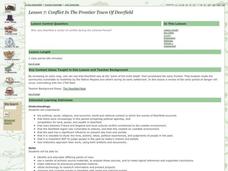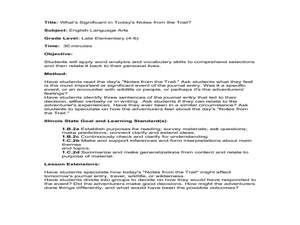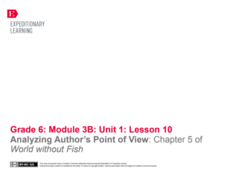Curated OER
Lead Critical Reading
Students read opposing views on the lead contamination issue, identify the facts and opinions in each article, and infer the opinion of the author. They create an essay expressing their opinion on the issue complete with citations.
Curated OER
Transcendentalism and Epiphany in Ray Bradbury's Dandelion Wine
Twelfth graders examine the characteristics of transcendentalism. In this transcendentalism lesson, 12th graders determine what this type of writing entails before reading a passage from, Ray Bradbury's, Dandelion Wine. They cite three...
Curated OER
Child Labor in the Carolinas
Fifth graders explore child labor and how children were exploited and used in the work place. For this Industrial Revolution lesson, 5th graders research child labor by reading, looking at photographs and drawing conclusions...
Curated OER
Conflict in the Frontier town of Deerfield
Young scholars use primary sources to investigate, explore and represent varying perspectives on the 1704 Deerfield Raid. They consider the reasons Deerfield was at the center of English, French and Native American conflicts in the early...
Curated OER
What's Significant in Today's Notes from the Trail?
For this instructional activity, you will need access to "Notes from the Trail." Your learners will read the day's text, and identify the most important or significant event in the journal entry. Not many prompting questions are...
Curated OER
Traveling With Limited Funds; A Tree Grows in Brooklyn
Students participate in a pre-reading activity which helps them see what it would be like to live in poverty. In this reading comprehension lesson, students make a list of items they take on a trip considering they have very limited...
Curated OER
“THE LORAX” by Dr. Seuss
Few children's books convey the message of conservation as well as Dr. Seuss' The Lorax. Read the story aloud, emphasizing the interconnectedness of plants and animals in an ecosystem and discussing different ways people can help...
Prestwick House
Teaching Shakespeare: Sonnet 73
It's that time of year to consider how Shakespeare selects his images and structures his Sonnet 73 to develop the meaning of the poem. Class members examine the rhyme scheme, the indented lines, the conceit, and the images used in each...
UAF Geophysical Institute
Carbon Footprint
Your young environmentalists can calculate their carbon footprint and discuss ways to reduce it with a worksheet about climate change. After reading a handout about what impact one's carbon footprint can have on the environment, kids...
Star Wars in the Classroom
"Shakespeare and Star Wars": Lesson Plan Days 13 and 14
How important are sound effects in films? In stage plays? In radio programs? To gain an understanding of the impact of these special effects, class members watch a short video spoof of the sound in a scene from Star...
What So Proudly We Hail
A Lesson on Benjamin Franklin’s “Project for Moral Perfection”
Benjamin Franklin identified 13 virtues that he felt would strengthen his character if he could focus on each one. A thorough lesson explores high schoolers' personal values in the context of their lives, and compels them to strive for...
Curated OER
American Dream and The Great Gatsby
Is the American Dream alive and well or has it dried up and died? As part of a study of The Great Gatsby, class members search for articles on the state of the American Dream, analyze the arguments presented in those articles, and then...
EngageNY
Analyzing Author’s Point of View: Chapter 5 of World without Fish
That's an interesting perspective. Scholars read chapter five of World without Fish and use an Author’s Point of View graphic organizer to determine the author's perspective. In triads, they highlight words that support the author's...
Channel Islands Film
Cache: Lesson Plan 4 - Grades 4-5
After viewing the West of the West's documentary Cache, individuals craft either a newspaper article chronicling the discovery of the cache on San Nicolas Island, a historical narrative of the placement of the cache in the cliff side, or...
Austin Independent School District
Visual Discovery Note Taking Sheets
Step into history and step out with a new understanding of events. These strategies bring a new level of understanding of key events by asking viewers to engage in and respond to projected images. Complete directions for the activity, a...
Biz Kids
Understanding Business Ethics
After screening an episode by BizKids, scholars show what they know about business vocabulary, then take part in grand conversations about role models and ethical dilemmas.
Curated OER
Rhetorical Devices
Twelfth graders identify and analyze examples of rhetorical devices as valid or invalid inferences. In this text analysis lesson, 12th graders research a controversial topic in teams and identify rhetorical devices for the topic....
Curated OER
Heart Mobiles In Action
Students design a mobile or wall hanging that reviews the circulatory system. In this circulatory system lesson, students work in small groups to identify the structures of the heart, and create a model in the form of a two or three...
Curated OER
Maus: After Reading Strategy Instructional Routine
Class members create literary mandalas for two characters from Maus, Art Spiegelman’s graphic novel about his father’s experiences with the Holocaust. After finding quotes that reveal three good traits and three bad traits of each...
Curated OER
Unsent Letter: Characterization in Briar Rose
After completing Jane Yolen’s Briar Rose, class members assume the voice of Gemma and craft a personal letter to her granddaughter telling Becca how she feels about Becca’s actions and the discoveries at Chelmno. Complete directions for...
Curated OER
A House Dividing: The Growing Crisis of Sectionalism in Antebellum America
Learners explore the debates over American slavery and the power of the American federal government for the first half of the 19th century and how the regional economies and political events produced a widening split between the states.
Curated OER
Reading Between the Lines: Making Inferences About Idioms
Students discover idioms. In this inferencing activity, students identify idioms from passages and infer meanings of unknown idioms using prior knowledge and experience. Students write sentences using newly learned idioms.
Curated OER
Colors, Characters, & Clues
Students investigate inferences. They define inference, view a Powerpoint presentation, answer questions about a picture book, and identify clues throughout the story as examples of inferences.
Curated OER
Get the Joke!
Students explore humor through word context and inference used in everyday language.

























